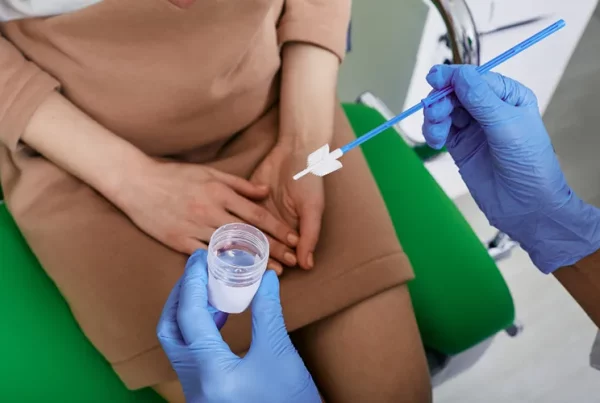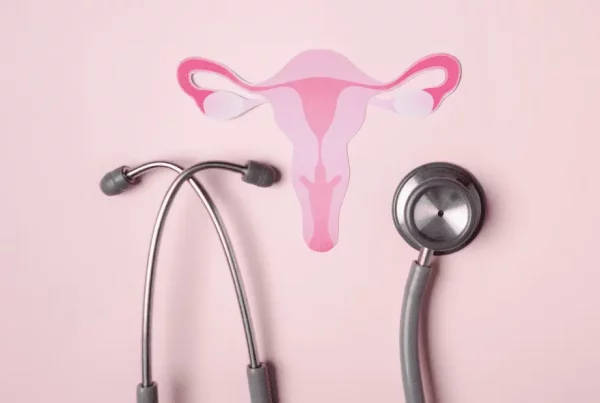
Endometriosis is a gynaecological condition where cells from the endometrium (tissue lining the uterus) are found outside the uterus and in other areas like the ovaries, fallopian tubes, and ovarian ligaments. The tissue begins to grow and thicken and releases blood and inflammatory chemicals during menstruation, which usually results in painful menses.
About 10% of the female population have endometriosis. In the sub-fertile population, it could go up as high as 40% to 50%. In fact, these numbers may be even higher since affected women might not be aware and even if they do experience symptoms, many tend to brush them aside thinking that it is normal.
There are 4 stages of endometriosis. Determining factors include the location, size, number, and depth of the endometrial tissue being implanted.
Stage 1: Minimal
There are some small lesions and endometrial tissue growing on the ovaries. Some inflammation around the pelvic area might be observed.
Stage 2: Mild
There are small lesions and shallow implants on the ovaries and pelvic area.
Stage 3: Moderate
There are more lesions and deep implants on the ovaries and pelvic area.
Stage 4: Severe
There are even more lesions and deeper implants on the ovaries and pelvic area. Other organs such as the bladder, ureter and bowels may also be affected.
Apart from implants outside the uterus, endometrial tissue can also grow and penetrate the muscle layer of the womb. This is also known as adenomyosis.
What are the Symptoms of Endometriosis?
A common symptom of endometriosis is severe pain during menstruation. The endometrial tissue growing outside of the uterus tends to bleed during menses, which brings about the release of certain chemicals that are inflammatory, leading to pain and other problems. As a guide to differentiate between normal menstrual cramps and pain caused by endometriosis, the pain should not affect your day-to-day functions. If you are skipping social activities or needing time away from work because of painful periods, it is essential to seek medical help.
Other symptoms include:
- Heavy periods
- Cold sweat, nausea or near faint spells
- Sensation of urge to pass motion during menses
- Painful urination
- Painful intercourse
- Lower back pain
- Bloating and abdominal swelling
- Chronic fatigue
- Infertility
What are the Causes of Endometriosis?
There is no exact cause for endometriosis but there are a few theories. The main accepted one is the back flow of menstrual blood during menstruation in some women. It is not clear why this happens but some women from this group then go on to develop endometriosis. The back flow carries the cells to other organs like the ovaries, rectum and pelvic ligaments, and causes other problems. When the endometriosis cells penetrate into the deeper layers, they can impact the nerves, and cause severe back pain or even shooting pain down the legs. In severe cases, the ureter, which carries the urine from the kidney to the bladder, can be strangulated, preventing the excretion of urine and possibly leading to kidney failure.
Am I at Risk of Developing Endometriosis?
Although the causes of endometriosis remain unknown, there may be several risk factors that could contribute to developing this condition:
- Genetics and having a family history of endometriosis
- Lifestyle choices like delayed childbirth, fewer childbirths, or not giving birth at all
- Any medical condition that prevents normal menstrual flow
- Alcohol consumption
When should I Seek Help and Who can I Seek Help From?
Seek help from a gynaecologist, particularly one who is an endometriosis specialist, as early as possible once these symptoms are experienced.
Early diagnosis will allow for a wider range of treatment and management options, rather than at a later stage where treatment options are limited, often requiring surgery.
How do I Know if I have Endometriosis?
The gynaecologist will first assess the patient based on symptoms experienced and family history. The assessment will also include pelvic ultrasound scan but a definite diagnosis will be from a laparoscopic examination. Laparoscopy is a minor surgical procedure performed under local or general anesthesia. A thin, pencil-like instrument called a laparoscope is inserted via the abdomen to identify any endometrial implants in the abdomen or pelvic area so as to determine the treatment for the patient. Biopsies may be done during the procedure to provide more information on the abnormal tissues.
- For more serious cases, surgical treatment might be considered. Two kinds of surgery can be performed – conservative and definitive.
- For women who are still considering having children, conservative surgery is recommended. Endometrial tissue outside the womb is removed as much as possible while preserving the uterus and ovaries, so as to preserve fertility.
- For women who have completed their family planning, definitive surgery like hysterectomy (removal of the uterus), can be considered, especially for adenomyosis. The ovaries may or may not be removed depending on how extensive the endometriosis is. The patient will not be able to conceive once her uterus is removed.
- Since surgical treatment may suppress some ovarian function and have a certain downtime, doctors are more careful not to subject patients to repeat surgery. Most endometriosis experts will advise that the first surgery should be as thorough as possible so as not to leave behind tissue which may flare up again.
How is Endometriosis Treated?
Endometriosis treatment will depend on the patient’s age and fertility considerations.
If the patient is young and the condition is not as serious, medications are the first line of treatment. These include nonsteroidal anti-inflammatory drugs (NSAIDs) like ponstan, and painkillers such as paracetamol, which help to relieve symptoms like painful cramps.
The next class of treatment is hormonal therapy. These hormone supplements help to slow down the endometrial tissue growth and prevent new implants. Some of such therapies include birth control pills, GnRH injections, and progestin. However, once the treatment stops, the symptoms could come back. In addition, the use of hormonal therapy is also dependent on whether the patient is planning for pregnancy during the treatment phase.
As endometriosis is known to recur even after surgery, most doctors will manage the condition with continual medical therapy thereafter.
What are the Complications of Endometriosis?
If left untreated, endometriosis is likely to worsen. More pelvic organs will be affected and implants can infiltrate deeper into the organs and tissues. When the small capillaries and nerves get involved, the pain becomes worse. And if other organs like the rectum gets affected, it may cause other problems such as rectal pain or painful bowel movement.
Endometriosis is a huge cause of infertility, especially if it is allowed to worsen. With the most common sites of infiltration being the pelvic ligaments and ovaries, which are just next to the fallopian tubes, there may be surrounding inflammation that could lead to the tubes being blocked, resulting in fertility issues. Sometimes, the patient might require IVF to get pregnant.
Another complication is endometriosis-related cancers; most commonly ovarian cancer. If a woman has endometriosis, the risk of developing ovarian cancer is about 2 to 3 times higher than the regular woman. Chances of a regular woman developing ovarian cancer is about 1 in 80 lifetime risk.
Key Things to Know About Endometriosis
- Endometriosis is a lifelong condition and symptoms usually improve only after the onset of menopause.
- You need not suffer in silence. There are treatment options available in Singapore to manage the pain that arises from endometriosis.
- If the pain is affecting your quality of life, visit a gynecologist as early as possible to get treatment.
- Awareness and early intervention are key to prevent situations where even surgery may not help or where infertility cannot be reversed.



